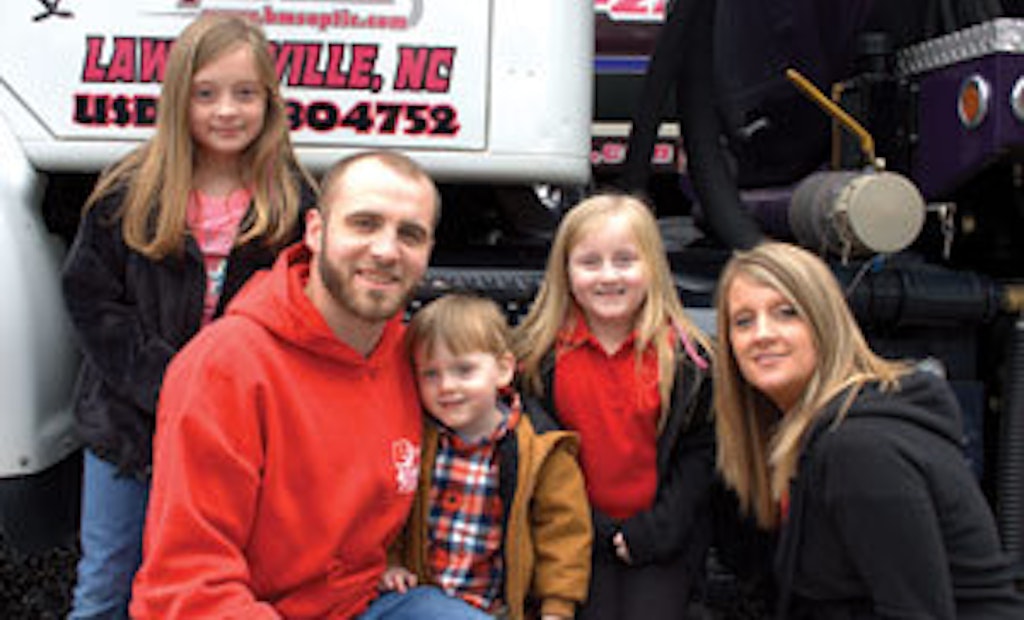
Interested in Safety?
Get Safety articles, news and videos right in your inbox! Sign up now.
Safety + Get AlertsJosh Branscome has been cleaning drains and installing and pumping septic systems for more than a decade, and owns B & M Septic Tank & Drain Service Inc. in Lawsonville, N.C. The 24-year-old has run the business for six years, and has been a paramedic for the Stokes County Emergency Medical Services for just as long. But all that training and experience didn’t help him when he let his guard down on a recent job and paid a high price for momentary carelessness.
It only takes a moment
The day of the accident, Branscome and his crew were installing a septic system. He was standing atop the precast concrete tank already in the ground, monitoring the backfilling being done by his foreman, Gray Mabe, with their New Holland 555E backhoe. Branscome looked away briefly as he turned to step off the tank. In doing so, he momentarily moved out of Mabe’s line of vision, and that was all it took. Mabe continued to swing the bucket around with a last load of dirt, assuming Branscome remained where he had been. In fact, his boss was now on the ground, closer to the boom and directly in its path, with his back to the action.
Branscome caught the full force of the bucket in his left shoulder, knocking him down a 15-foot embankment behind the tank. He suffered three torn ligaments in his left shoulder and down into his clavicle. Aggravated tendinitis is the lingering result, and his left hand was still numb two months later. Still, he maintains, “I was lucky, because another six inches higher and it would have hit me in the head.”
Training’s not enough
That may be true, but luck’s not what any contractor should rely on to keep everyone safe, and no one is more aware of that than Branscome.
“I’m absolutely responsible for what happened,” he admits. “It was a few weeks before Christmas, we all had our minds on other things and were in a hurry to get done. I’ve stood on the tank during an installation a thousand times, always thinking I was out of reach of the tractor. Now we know you can’t always gauge that distance accurately, so we don’t get anywhere close to the backhoe when it’s running.”
Branscome thoroughly trains all crew members when they start, and they receive refresher training as needed. But he says this accident has driven home that knowing the right thing to do and actually doing it are two separate things.
“I always tell everybody they should never be in reach of that machine. Someone could pull the wrong lever by mistake or a lever could get stuck, and that backhoe could do something you don’t expect. I’ve always thought about it, but more in the back of my mind. Now I make sure I’m consciously paying attention.”
He says it all happened so quickly, his EMT training didn’t kick in, but another of his crew – also a paramedic – immediately rushed to his boss’s side. Branscome actually finished the job, running the backhoe, because they still had 600 feet of drainfield to put in. Then he went to the hospital, was treated and released after a couple hours. Afterward, he went home and literally sat in his recliner for three days, a huge change for a guy who typically works 70- to 80-hour weeks.
Costs really add up
The real costs of the accident have been significant. Branscome was off work from the ambulance for a month because the nerve damage made it impossible for him to pick up anything. He’d saved up sick time there, so he didn’t lose any actual income. But he estimates the monetary value of those sick days, along with the costs of his MRI, doctor bills and the labor he had to hire to staff the septic truck, totals $3,000 to $4,000.
He’s back at work on both jobs and doing physical therapy, but it’s going to take a while to regain full hand function. “The doctors say if I’m careful, I should get rid of the numbness,” he says. Eventually, he’ll need surgery to clean out torn cartilage and repair damaged ligaments.
The one bright spot was that he got to spend the holidays with his family for the first time in three years, but there was a high price to pay in terms of pain, lost productivity and profits.
“It was a big wake-up call,” he says.
Safety awareness spreads
His entire four-person crew sat down to discuss how they could work more safely, talking about the accident and paying more attention to their surroundings. They’re now working toward active situational awareness, knowing exactly where everyone is at all times, and not getting too close to operating equipment.
They’ve started talking about all facets of safety, such as carrying pipe that’s too heavy and wearing safety gear. They’ve recently purchased two Top Poppers (www.TandTtools.com) for lifting manhole covers, acknowledging it’s just not smart to put anyone’s back at risk for lack of proper tools.
“And we’re going to take our time, no matter how backed up we are,” Branscome says. “Because hurrying is when accidents happen. So from now on, it’s not just a good idea – it’s how we’re doing things.”





